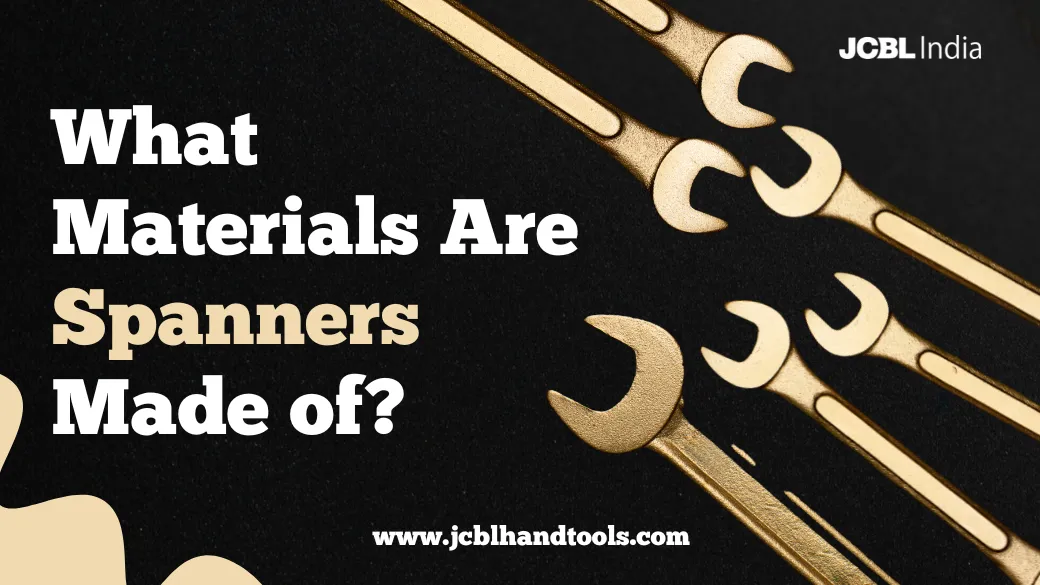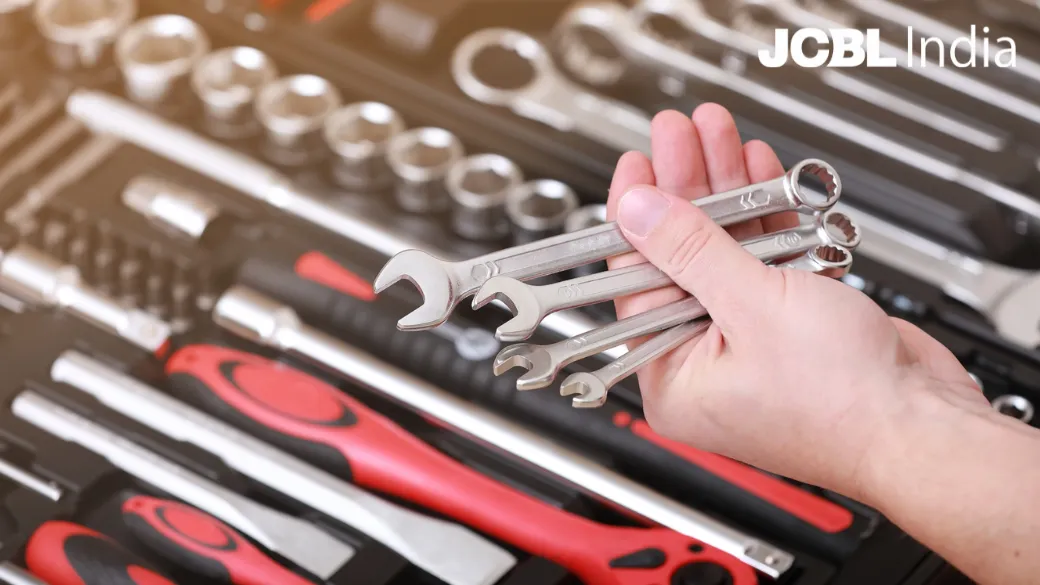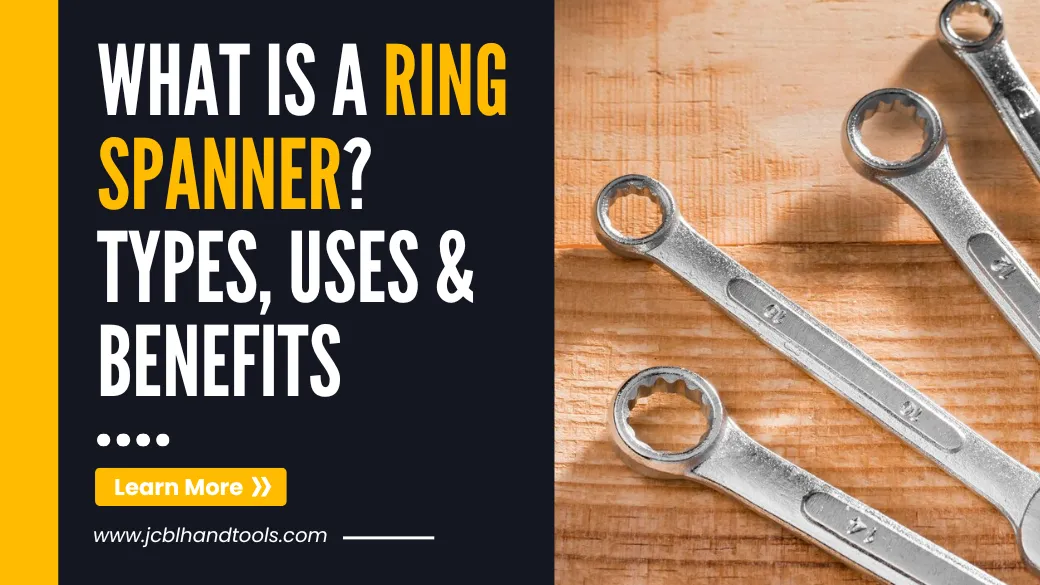What Materials Are Spanners Made Of?

Spanner is one of the essential tools in your toolbox. You don’t know when you’ll have to fix a machine. It is a handy tool that helps you to maintain a tight grip on nuts and bolts to tighten or lose them. From DIY projects to home repairs and professional workshops, it is a hassle to fasten nuts and bolts without them. Also, the performance, usability, and durability of the spanner lie in its material. Do you know which spanner is right for you? There are a variety of spanners with different materials are available in the market. To clear out your confusion and help you choose the right one up to your needs, this blog discusses different materials used to manufacture spanners. Also, a comparison is performed to help you decide the best one for your toolbox.
Why does the material matter in spanners?
“Strength and durability of your tool depends on the material it is made of.”
The material of the spanner is not only responsible for its strength but also flexibility, weight, and wear and corrosion resistance. It ensures how well it will perform under a high-stress environment and how long it will last. For example, a spanner made with poor corrosion resistance has a reduced lifespan. Meanwhile, high-quality alloy steel can withstand heavy loads and have a longer lifespan. By understanding the material of the spanner, you can prevent premature failure of the tool.
Common materials used for spanners
Spanners are made of different materials ranging from carbon steel to chrome vanadium steel. each has its unique properties, pros, and cons. Let’s discuss about common materials used for spanners-
Carbon steel spanners
Carbon steel spanner is the most common and affordable type of spanner. It comprises iron and carbon, thus it is strong enough for general uses. But, it is prone to rust if not taken care of or coated. such spanners are low maintenance and easier to clean. It offers adequate strength, thus suitable for light-duty tasks and home repairs. Further, it can withstand high and low temperatures. However, don’t use them for heavy-duty applications as they have a lower load value than average spanners.
Stainless steel spanners
Stainless steel spanners are popular for corrosion resistance. The stainless steel contains chromium that protects the metal from rust and corrosion. Also, these spanners have attractive finishes and can be used in wet and humid environments. They are a little more expensive than carbon steel spanners. However, they are not very durable in high-stress conditions. They are less strong than chrome vanadium steel and cannot handle high tensile stress, thus less suitable for heavy-duty tasks.
Chrome vanadium steel spanners
Chrome vanadium steel spanners are known for their strength, durability and resistance against rust, corrosion, and oxidation. these spanners are comprised of silicon, manganese, chromium, and vanadium. The chromium protects against corrosion and oxidation. Meanwhile, vanadium increases strength and durability. they are more efficient than carbon steel and stainless steel spanners. such types of spanners are suitable for heavy-duty work, as they have high tensile strength. Their only drawback is that they are slightly more expensive and heavier than other materials of spanners.
Aluminium alloy spanners
Aluminium alloy spanners are lightweight, and thus easy to handle. They are suitable for tasks that require precision instead of strength. Also, they do not have durability. This type of spanner is corrosion-resistant and suitable for light-duty tasks. These are the best choice for tasks where prolonged use of spanners is required as it does not cause fatigue. they are less durable than steel and CRV steel spanners, as well as can wear out faster.
Brass Spanners
Brass spanners are used in the application areas where sparking can be dangerous. Industries like oil, gas, and mining use them due to their non-ferrous nature. Unlike carbon and steel, brass does not produce sparks when struck. This makes brass spanners a safer choice. However, these are not suitable for high torque applications due to softer metal. These are prone to bending and have high wear and tear.
Comparison between different spanner materials
While selecting a spanner, it is important to consider many factors on which their performance and lifespan depend. In the following table, a quick comparison to the common materials of spanner has been made-
| Material | Strength | Durability | Corrosion Resistance | Cost |
| Carbon Steel | Medium | Medium | Low | Low |
| Chrome Vanadium Steel | High | High | High | Medium |
| Stainless Steel | Medium | Medium | Very High | High |
| Aluminum Alloy | Low | Medium | High | Medium |
| Brass | Low | Low | High | High |
Material coatings and their importance
The material of the spanner is not the only factor on which spawners’ longevity depends. However, the coating of the spanner has an equal role to play in improving rust resistance and durability. Different types of coatings are applied on spanners including chrome, nickel, and black oxide.
- Chrome plating creates a shiny and corrosion-resistant surface layer. Thus, it is easier to clear and clean. Also, it improves their efficiency under humid and corrosive environments.
- Nickle coating also creates a corrosive resistance but it is mainly suitable for the tools to use in the marine environment.
- Black oxide coating provides rust protection to reduce glare. This is ideal for the tools to be used under bright lights.
Selecting the spanner of the right material for your needs
As now you are aware of the properties, pros and cons of different materials used in spanners, you can choose the right one up to your needs. Here are a few guidelines that you can follow to select a spanner of specific material to your specific need-
| Need or Environment | Type of Spanner | Advantage |
| DIY Home Projects | Carbon Steel | Affordable, strong for light tasks |
| Automotive or Industrial Work | Chrome Vanadium Steel | Durable, rust-resistant, heavy-duty applications |
| Marine or Outdoor Environments | Stainless Steel | Excellent rust resistance in moist conditions |
| Precision or Lightweight Jobs | Aluminum Alloy | Lightweight, easy to handle for long periods |
| Hazardous Environments | Brass | Spark-resistant for safety in dangerous settings |
Conclusion
Overall, the material of the spanner is a key factor to consider while purchasing one. The performance, durability, and lifespan of the spanner depend on the type of material used, its coating and the environment where you are using it. Thus, selecting the right material spanner up to your needs is important.
Get yourself high-quality spanners of CRV steel and other materials at JCBL Hand Tools. Here, we manufacture and supply hand tools that meet international quality standards for your daily and professional needs. Visit us to check our products.;
FAQ’s
What is the most durable spanner material?
Chrome vanadium steel is the most durable material for the spanner. Further, it offers toughness, strength, and resistance against corrosion. However, it also has drawbacks like they are heavier and more expensive than other materials.
What material is tool steel?
Tool steel is an iron-based alloy that is composed of carbide-forming metals like chromium, tungsten, molybdenum, vanadium etc.



